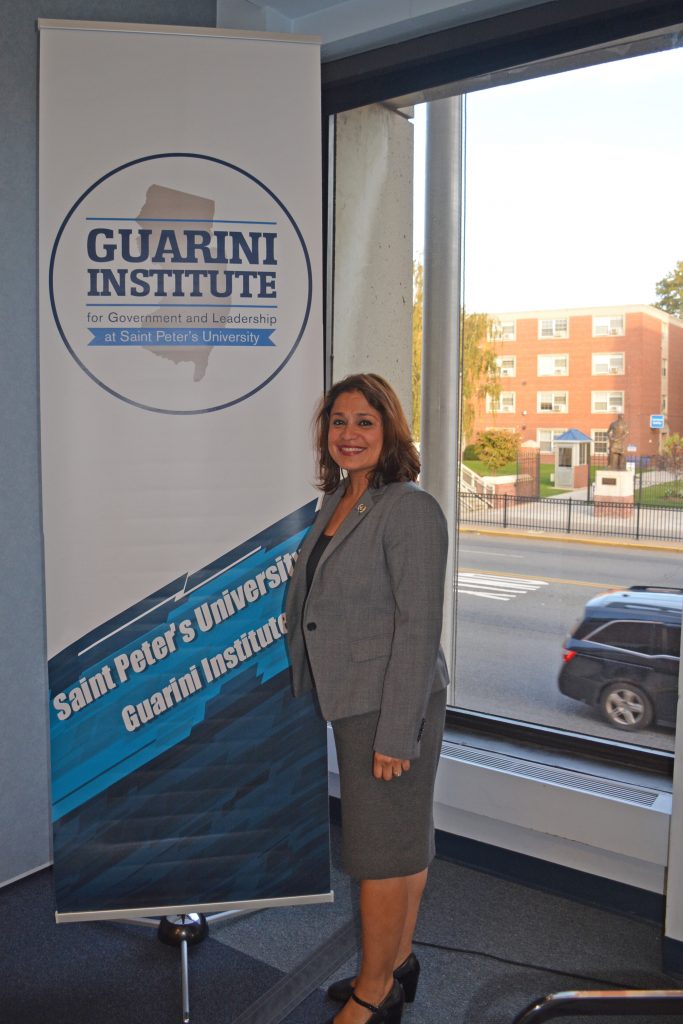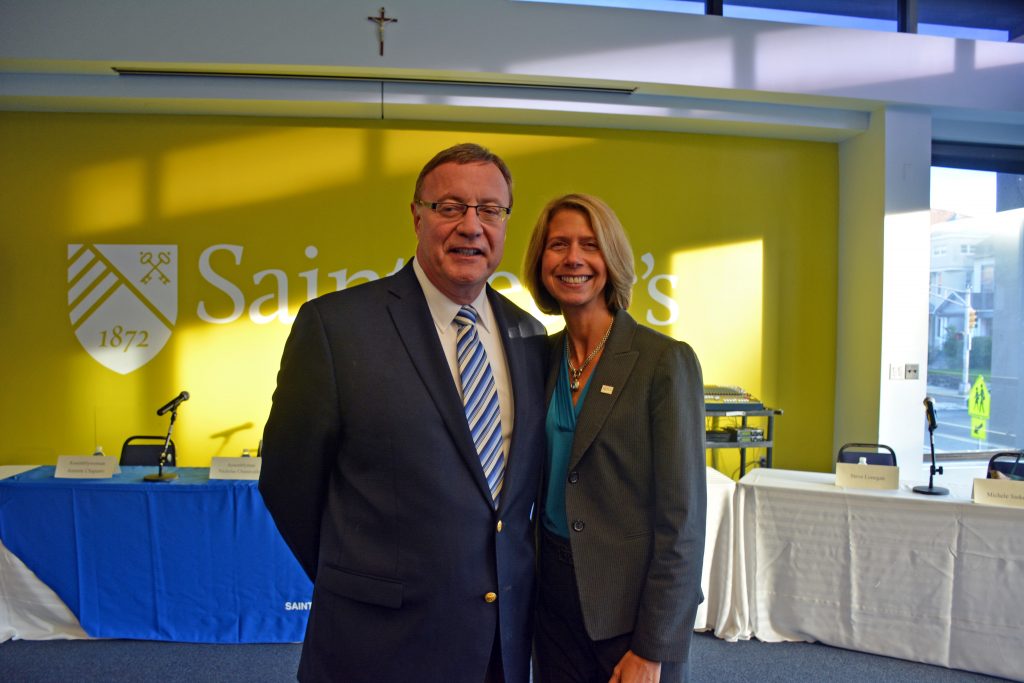
Annette Chaparro
The Guarini Institute for Government and Leadership at Saint Peter’s University is dedicated to exploring key public policy issues at the local, state and national level. The latest panel hosted by the Institute on Tuesday, October 11 was focused on a critical issue in the state of New Jersey—raising the minimum wage to $15/hour.
New Jersey’s top Democrats proposed a bill (S-15) to increase the minimum wage to $15, but critics argue that such an increase will have negative consequences for small and mid-size businesses. The topic has been widely discussed as some see it as a way to alleviate poverty and close the gap in New Jersey between what people are paid and what they need to live. Others contend that the increase will put a burden on small and mid-sized businesses and in return, actually hurt those it is intended to help.
An esteemed panel of experts came to Saint Peter’s to share their opinions. The members of the panel included Annette Chaparro, assemblywoman of the 33rd legislative district; Nicholas Chiaravalloti, assemblyman of the 31st legislative district; Steve Lonegan, businessman and Republican politician; Marilu Marcillo-Gomez, Ph.D., assistant professor of business at Saint Peter’s University as well as the director of the Office for Diversity, Equity and Inclusion and chair of the Advisory Council for The Center for Undocumented Students; Gordon MacInnes, president and chief executive of New Jersey Policy Perspective; Michele Siekerka, president and CEO of New Jersey Business & Industry Association and Nick Sacco, senator and mayor. Mary Kate Naatus, Ph.D., associate professor of business, chair of the Department of Business Administration and the director of research for the Ignite Institute at Saint Peter’s, served as the panel moderator.
Dr. Naatus wasted no time getting to the point as she asked two panelists with opposing viewpoints if the increase in minimum wage will reduce poverty.
Sacco answered that it is one tool that will help people live a better life in New Jersey, where the cost of living is high. However, if the federal government mandated the increase, it would be better so that employers would not cut back on their employees or the hours given to employees, which many fear will happen.

Steve Lonegan and Michele Siekerka
On the other hand, Siekerka responded that raising the minimum wage would not help. She argued instead for skill building.
“Minimum wage is an entry point. If we build workers’ skill sets they can advance and get raises,” she
said. “Workforce development is key not artificially setting wage floor,” she tweeted during the panel discussion (follow her at @SiekerkaNJBIA).
Raising the minimum wage would offset all the other wages, she contended. In addition, the generalization of applying the increase to all industries does not work. Each industry needs to be researched and treated differently.
Part of the argument against raising the minimum wage is that costs for businesses will increase. How can businesses absorb these costs?
“They can’t absorb them, they will find ways around them,” said Lonegan, who solidified his opinion with the declaration, “The increase to minimum wage is a dagger in the hearts of small business.” Lonegan supported the elimination of minimum wage altogether. He also argued that no small business would pay $15 an hour for traditionally low-paying labor jobs and robots and machines will likely replace these jobs soon.
Dr. Marcillo-Gomez agreed with him that businesses would not be able to absorb the costs, stating that most businesses in New Jersey are small and they operate with low profit margins. The businesses will most likely be forced to downsize their workforce and raise the price of goods.
Chaparro had a different view. She argued that rent was hurting business, not the extra money per hour. She stated that the people who would be making $15 are mostly women who are going to use that extra money to support their families.
MacInnes agreed with her, stating that the families getting this wage increase are not going on vacation; they are actually taking that money and spending it locally, balancing the economy.
“This is an attempt to try to close the gap in New Jersey between what people are making and what they need to survive,” he said.
In the end, the panel remained divided with strong arguments both in support of and against the minimum wage increase. In general, the panel agreed that the cost of living in New Jersey is high and the minimum wage increase may or may not affect the economy.
Join the Guarini Institute for Government and Leadership at their next panel discussion: “The N.J. Heroin and Opiate Crisis,” on October 24 in The Duncan Family Sky Room from 5:30 – 7:30 p.m. Panelists include James McGreevey, 52nd governor of New Jersey; Tim Eustace, assemblyman of the 38th legislative district; Cody Miller, councilman and council president for the Township of Monroe; Michael DeLeon, founder of Steered Straight; Joseph Coronato, Ocean County prosecutor; and Michele Perez, director of the municipal alliance commission in Williamstown, N.J. Stephen Stirling, author of Herointown will moderate. More information about upcoming Guarini Institute events can be found here.
